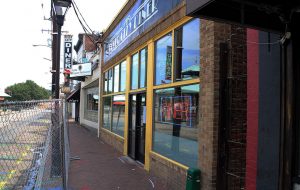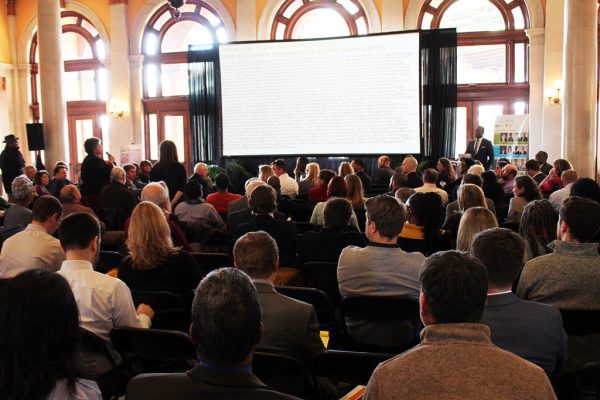An effort to breathe new economic life into parts of Shockoe Bottom while acknowledging its history as a slave-trade hub is getting some advice from other cities that have faced similar challenges.
A team of city planners, developers and consultants from such metros as New Orleans, Chicago and Pittsburgh converged on Richmond last week to observe and offer suggestions for a “shared vision for Shockoe Bottom” that would help guide development and invigorate the neighborhood as a destination area.
Richmond is one of four cities this year receiving land-planning assistance from The Rose Center for Public Leadership, a joint program of the National League of Cities and Urban Land Institute. The three other cities –Columbus, Ohio; Salt Lake City; and Tuscon, Arizona – were also represented on the team.
Highlights of the team’s recommendations for the Bottom include:
– using Main Street Station to house a previously discussed slave heritage site or museum that could capitalize on the station as a starting point for visitors;
– locating a school in the area that could include an urban agriculture curriculum tied to the 17th Street Farmers’ Market;
– the creation of an Office of Equity and Inclusion with a full-time project manager specifically assigned to Shockoe Bottom.
Mayor Levar Stoney selected Shockoe Bottom as the team’s focus area partly in response to private investment in the neighborhood, which has seen a wave of new development and redevelopment in the years since his predecessor, Dwight Jones, pitched the area as a site for a new ballpark.

EAT Restaurant Partners is purchasing the Shockoe Bottom River City Diner location at 7 N. 17th St. (J. Elias O’Neal)
The city is installing the Pulse bus rapid transit line along Main Street and redeveloping the farmers’ market, where Chris Tsui’s EAT Restaurant Partners group has committed to opening a new restaurant. On the same block, the owners of Lulu’s and Tio Pablo Taqueria recently purchased five buildings, and to the south, construction is wrapping up on Capital One’s business incubator at 1717 E. Cary St.
One of several challenges presented by the team was how the city can leverage such private investment and public assets in the Bottom while acknowledging its history and environmental and infrastructure challenges, with much of the area located in flood plains.
Presenters noted the majority of developable land in the area is controlled by a single property owner: the Loving family, who own Loving’s Produce and about a dozen properties around 17th, 18th, Franklin and Grace streets where the ballpark development had been proposed. The team noted other developable parcels remain available in the Bottom, but they stressed the need for a shared vision for the future of the area between the city and its largest landowner.
Speakers stressed that certain goals laid out in the recommendations would take time to achieve – a point Stoney reiterated in his remarks, encouraging attendees to remain vigilant.
“It is my hope when we look back 15 to 20 years from now that we can see the fruit of all of our labor, but we won’t get there without us all sharing that vision and being intentional about it all at the same time,” Stoney said.
The team presented its findings Thursday at Main Street Station after arriving in Richmond at the start of the week. The effort included input from a variety of local businesses, including real estate brokerages, property management companies, architecture firms and local developers.
Developers involved included Louis Salomonsky and Brian White of Main Street Realty, Robin Miller of Miller and Associates, Chris Johnson of Monument Cos., Andrew Basham with Spy Rock Real Estate Group, Andy Beach with UrbanCore Construction, and Zac Frederick with Crescent Preservation & Development Co.
The presentation with the team’s recommendations is posted on the city’s website. A video of the presentation is below:
An effort to breathe new economic life into parts of Shockoe Bottom while acknowledging its history as a slave-trade hub is getting some advice from other cities that have faced similar challenges.
A team of city planners, developers and consultants from such metros as New Orleans, Chicago and Pittsburgh converged on Richmond last week to observe and offer suggestions for a “shared vision for Shockoe Bottom” that would help guide development and invigorate the neighborhood as a destination area.
Richmond is one of four cities this year receiving land-planning assistance from The Rose Center for Public Leadership, a joint program of the National League of Cities and Urban Land Institute. The three other cities –Columbus, Ohio; Salt Lake City; and Tuscon, Arizona – were also represented on the team.
Highlights of the team’s recommendations for the Bottom include:
– using Main Street Station to house a previously discussed slave heritage site or museum that could capitalize on the station as a starting point for visitors;
– locating a school in the area that could include an urban agriculture curriculum tied to the 17th Street Farmers’ Market;
– the creation of an Office of Equity and Inclusion with a full-time project manager specifically assigned to Shockoe Bottom.
Mayor Levar Stoney selected Shockoe Bottom as the team’s focus area partly in response to private investment in the neighborhood, which has seen a wave of new development and redevelopment in the years since his predecessor, Dwight Jones, pitched the area as a site for a new ballpark.

EAT Restaurant Partners is purchasing the Shockoe Bottom River City Diner location at 7 N. 17th St. (J. Elias O’Neal)
The city is installing the Pulse bus rapid transit line along Main Street and redeveloping the farmers’ market, where Chris Tsui’s EAT Restaurant Partners group has committed to opening a new restaurant. On the same block, the owners of Lulu’s and Tio Pablo Taqueria recently purchased five buildings, and to the south, construction is wrapping up on Capital One’s business incubator at 1717 E. Cary St.
One of several challenges presented by the team was how the city can leverage such private investment and public assets in the Bottom while acknowledging its history and environmental and infrastructure challenges, with much of the area located in flood plains.
Presenters noted the majority of developable land in the area is controlled by a single property owner: the Loving family, who own Loving’s Produce and about a dozen properties around 17th, 18th, Franklin and Grace streets where the ballpark development had been proposed. The team noted other developable parcels remain available in the Bottom, but they stressed the need for a shared vision for the future of the area between the city and its largest landowner.
Speakers stressed that certain goals laid out in the recommendations would take time to achieve – a point Stoney reiterated in his remarks, encouraging attendees to remain vigilant.
“It is my hope when we look back 15 to 20 years from now that we can see the fruit of all of our labor, but we won’t get there without us all sharing that vision and being intentional about it all at the same time,” Stoney said.
The team presented its findings Thursday at Main Street Station after arriving in Richmond at the start of the week. The effort included input from a variety of local businesses, including real estate brokerages, property management companies, architecture firms and local developers.
Developers involved included Louis Salomonsky and Brian White of Main Street Realty, Robin Miller of Miller and Associates, Chris Johnson of Monument Cos., Andrew Basham with Spy Rock Real Estate Group, Andy Beach with UrbanCore Construction, and Zac Frederick with Crescent Preservation & Development Co.
The presentation with the team’s recommendations is posted on the city’s website. A video of the presentation is below:




There are an estimated 27 Million people still held in slavery worldwide, mostly in Africa and Asia. If we could use the American slavery experience as one to explain the global problem, we would have a unique draw for tourists. Lets make our Slavery Museum be one that brings hope to those who are in need.
Well said
Well said just don’t except much action. Here is some history of plans over the last decade
2009 –
http://www.richmond.com/news/slave-trail-commission-unveils-detailed-shockoe-bottom-plans/article_038c21a2-c517-58d7-892b-d8089a17794e.html
2011 –
http://www.richmondgov.com/EconomicCommunityDevelopment/documents/ShockoeFinalDraftStrategy11_1.pdf
2014
https://wilder.vcu.edu/media/wilder/murp-studio-plans/ursp637/pdfs/CommunityConservationFinal.pdf
And of course Sacred Ground has worked on a great plan since 2009/10 supported by many citizens but ignored by all politicians.
[…] If you missed last week’s presentation on our sister neighborhood Shockoe Bottom, below is a rundown of what happened from the City of Richmond but first, a quick TL;DR from Richmond Bizsense […]